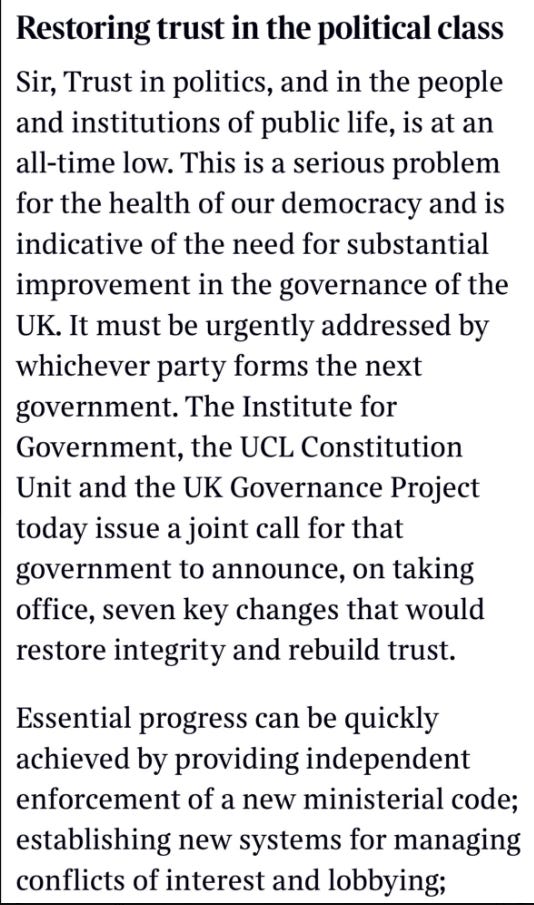Seven changes for a better constitution?
Some interesting proposals from some good people
In the Times today there is a letter published from various good sorts putting forward seven practical and easy-to-make steps for a better constitution.
One of the signatories, David Anderson, helpfully posted the letter on Twitter:
*
Of course, changes to form and structure can only take us so far. The biggest problem of recent years has been an underlying lack of constitutionalism from government ministers (cheered and clapped by their political supporters). And until attitudes change, then rules will always be gamed or ignored and discretions abused.
But, there has to be a start somewhere to repair the damage, and these are interesting proposals.
The suggestions appear to be:
independent enforcement of a new ministerial code;
establishing new systems for managing conflicts of interest;
ditto, for lobbying;
improving regulation of post-government employment;
ensuring appointments to the Lords are only made on merit;
ensuring other public appointments are rigorous and transparent; and
strengthening the independence of the honours system, including by ending prime ministerial patronage.
The worthies aver that legislation is not necessary for most of these changes but a short bill would create the necessary powers and embed the independence of the ethics and integrity system.
*
Some may say that these proposals are a little “apple pie” - but they would be a move in the right direction, the least that can be done.
Words like “ensuring” and “strengthening” are easy to type - and they are almost as easy to put at the start of a sterling bullet point.
But what is the actual check on misuse? Who in practice will have the power and authority to say “No” to a trespass by a minister of the crown (or by a former minister of the crown)?
The robustness of any regulatory system is not so much in the rules being themselves commendable, but in the rigorous enforcement of those rules and in the ready and realistic availability of sanctions for breach.
In a word: there needs to be tension.
And in our constitutional arrangements, as they stand, only parliament and the courts - rather than third party agencies - have the strength and the legitimacy to check the executive on an ongoing basis, and so for each of these seven laudable aims, one question is how they can be enforced against the government’s will by other strong and permanent elements of the state.





These are limitations on what some Powers may do.
I think the Australians have it right in requiring an action by each citizen - vote.
The corresponding obligation by the State, and one to add constitutionally, would be to attempt to obtain a vote from each citizen.
Not permit, attempt.
As you say, this is probably the least that could be done. Wholly insufficient and would pass without notice by many of those who these worthies hope to reassure.